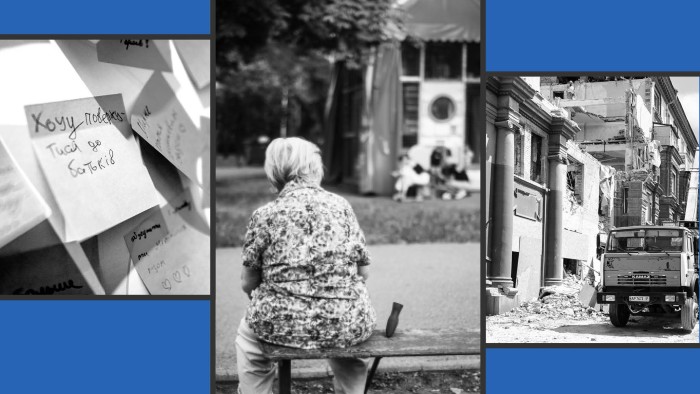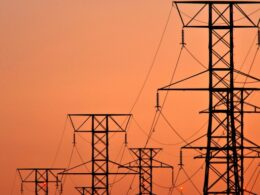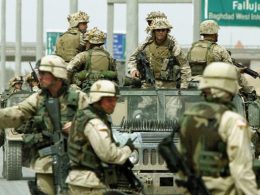Ever since fleeing her Russian-occupied hometown of Melitopol three years ago, Kateryna has longed for a chance to return and see her mother again.
But watching the Trump administration in America’s negotiations with Russia over how to end the war in Ukraine, the young schoolteacher has found herself rapidly losing hope.
“We can see that the question of the occupied territories is not even on the table,” Kateryna said. “So the outlook by this point is already pretty clear. We’re not going to see our parents any time soon.”
Kateryna is among hundreds of thousands of Ukrainians who fled from the country’s south after Russian troops seized large areas in early 2022 and imposed their rule on the population through a campaign of violence and forced assimilation.
She left believing her departure would be temporary. Her parents stayed in Melitopol. “Then two weeks turned into three years,” she said. Now she fears she will never see them again.
In interviews with the Financial Times, Ukrainians displaced from areas occupied by Russia expressed a similar sense of resignation and dread about the negotiations unfolding in Saudi Arabia this month, fearing the outcome of talks shaped by a US administration seen as indifferent to their experience and heavily influenced by Moscow.
Under President Donald Trump, Washington has refused to label Russia the aggressor in Ukraine. Last month, his administration temporarily suspended military aid to Kyiv, signalling for many that the US was prepared to sacrifice Ukraine’s territorial integrity for the sake of a ceasefire.
All Ukrainians displaced from occupied areas asked not to share their surnames as they were concerned for the safety of family members living under Russian rule.
Many said they had long recognised that Russia was unlikely to give up its grip on the almost 20 per cent of Ukrainian territory it had seized since 2014 — first by annexing the Crimean peninsula, then through an armed conflict in the Donbas region and, in 2022, with the full-scale invasion of Ukraine.
Kyiv’s hopes for swapping territory with Moscow also shrank this spring after its forces were pushed out of the roughly 1,000 sq km of Russia’s Kursk region they seized last year. They now hold a mere 69 sq km, according to Ukrainian military analysis group DeepState.
Still, many displaced Ukrainians held on to hope that some resolution could be found. For this reason, Kateryna chose not to settle far from home.
Like tens of thousands of her neighbours, she stayed in Zaporizhzhia, the closest city to her former home. She did so despite the risks of living in a city just 30km from the front line — and in a region Russia now seeks to fully occupy.
“It’s not safe here. I don’t know a day when there hasn’t been an air strike on this town,” said Maksym, who also fled Melitopol for Zaporizhzhia with his family. “But I chose to stay here, so that I could return.”
Now, he said, watching the US-led talks, he felt let down. “If I had thought that this was going to happen, I would not have put my family in this kind of danger. We’d have gone to Spain or something.”

Polling by the Kyiv International Institute of Sociology has found that the number of Ukrainians open to some territorial concessions in order to achieve peace as soon as possible rose from just 8 per cent in December 2022 to 39 per cent in March 2025, reflecting the enormous strain of Russia’s full-scale invasion. About half oppose any territorial concessions.
Kateryna, Maksym and other displaced people who spoke to the FT said they wanted a settlement.
“I don’t want people to keep dying,” Maksym said.
But all said they wanted a deal that would bring them justice and compensation for what they lost.
For Kateryna, this means safe passage to Melitopol, so she could be reunited with her mother, pick up belongings and sell her apartment to raise capital with which to start a new life.

Maksym only left Melitopol when armed Russian security forces came to his workplace and threatened to jail him. He passed 24 checkpoints to get out, his two young children forced to witness their father strip-searched at gunpoint by Russian troops.
The family made it out, but left everything behind, including three apartments that constituted the family’s entire wealth. Now, he said, they live in poverty in Zaporizhzhia.
The injustice, he said, made him angry. But at this point, he wants a solution. “However these negotiations may end, for displaced people, the only chance to live with the outcome is if there’s an agreement on giving us access to our relatives and to our property,” Maksym said.
“We need to be able to at least travel there, see our people, enter our apartments again, perhaps sell them. Otherwise, we will just decay.”

But after several rounds of talks, Ukrainians from occupied territories fear the result of negotiations led by a US administration that has made overtures to Russia while meeting Ukraine’s leaders with overt hostility.
“[Trump] says that he doesn’t see Russia as the guilty party in this invasion. But how else could it be, if every night there are drones over my head?” said Olena, who fled the occupation in early 2022.
She and her husband left behind a house they built themselves. Six months later a neighbour called to tell them that the city’s new Russian administrators had labelled the house as abandoned.
Then new people moved in. “Our grand new guests. Taking over our home,” Olena said. “With all our belongings, all our stuff still there.”
Now living in Dnipro, Olena said she struggled to pay the rent.
Russia’s territorial claims extend beyond the areas it has seized militarily. They cover the whole of four Ukrainian regions, including the city of Zaporizhzhia, a 700,000-strong industrial hub that Russia has never held.
Steve Witkoff, Trump’s Middle East envoy, recently appeared to back the Kremlin line that all these areas were Russian-speaking and want to join Russia. Witkoff told Tucker Carlson last month the regions had held “referendums where the overwhelming majority of the people have indicated that they want to be under Russian rule”.
This was received by Ukrainians with dismay. The referendums Witkoff mentioned were staged in 2022 by heavily armed Russian occupying forces demanding compliance from a local population under extreme duress. They were never recognised by the international community.
Sergey Mironov, a member of the Russian parliament, said recently that no ceasefire deal was possible without the US meeting all of Russian President Vladimir Putin’s requests — including a Ukrainian withdrawal from the administrative boundaries of the regions of Donetsk, Luhansk, Zaporizhzhia and Kherson.
“Is Kyiv ready to withdraw or surrender? Can the United States persuade Kyiv to do so?” Mironov asked.
Veronika, a primary school teacher from the Enerhodar area who was also displaced by the occupation, said her family treated Russia’s claim to Zaporizhzhia city with “polite bewilderment”.
“You can write whatever you want on the fence, it doesn’t make it yours,” she said.
Last summer, Veronika asked Ukrainian volunteers working under the radar in occupied territories to help her elderly mother flee on a long route via Belarus and western Ukraine — a journey of nearly a week.
Born in Nazi-held territory during the second world war, 81-year-old Angelina in 2022 found herself under occupation once again. “I was afraid for two years,” said Angelina, who is now reunited with her family in Zaporizhzhia.
Veronika is still thinking about the home she left behind, and the land and lives lost in the war. “So if we just say ‘OK, now we stop,’ what did they die for?
“I don’t want any more people to die. But I want there to be justice too.”
Cartography by Steven Bernard
Source link









